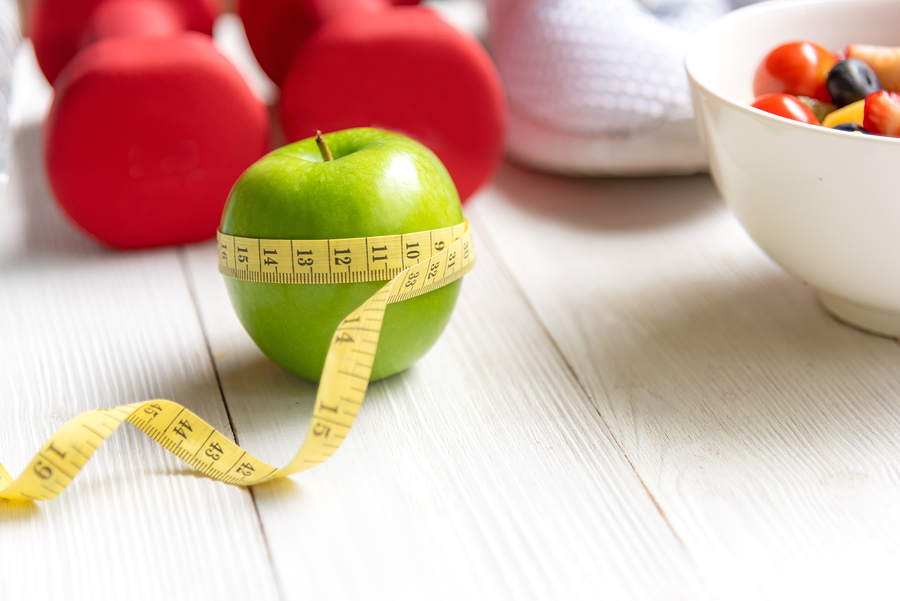The world of weight loss can be pretty crazy. There is tons of money to be made (and being made!) selling hot, new weight loss programs, books, supplements, training courses… you name it. And just when you think you’ve heard it all when it comes to weight loss methods and diets, another new trend appears.
How do these new weight loss methods and programs continue to gain traction when there are already so many “miracle” methods and diets out there? Well, it’s probably because so many women are still struggling to lose weight in spite of having tried every method under the sun! And despite the proliferation of weight loss products, books, and strategies everywhere you look, the obesity rates in our country are sky high.
Along with the constant rotation of fad diets, there are a number of pervasive myths about weight loss circulating in the media and in society that should have been dispelled a long time ago.
All of the misinformation and misunderstandings can make it feel totally confusing, and close to impossible to lose weight. I’m here to help you break through the noise. Real, healthy, and sustainable weight loss is possible, and it starts with ditching the big weight loss myths.
MYTH: The (insert diet name here) is the BEST way to lose weight
Any statement like this, even if it’s coming from someone who you trust and who has good intentions, is a red flag! The way your body responds to food and exercise, and the relationship between your body, hormones, and weight, is multilayered and unique. So, as a general rule, most “one size fits all” approaches are missing the mark.
But let me get into this a little bit more. This is actually an area where I hear my patients express a lot of confusion and disappointment when they first come to see me. For example, a few months ago, I saw a patient whose best friend had tried a ketogenic diet, and she had met her weight loss goal within a matter of weeks. She was also feeling fantastic, full of energy, her skin was glowing… she was this great success story for the keto diet!
Of course, my patient told me, she was encouraged and inspired. She started reading up on the keto diet, put together a meal plan for herself, she had her friend there for support, and it all seemed perfect. But unfortunately, although she dropped a couple of pounds at first, she didn’t have the same kind of success. By the time she came to me, she was feeling pretty defeated. She had even started wondering if the problem was that she made some kind of mistake with the food list for the diet.
I told her that this wasn’t the case, and that we should switch our focus away from the specifics of the diet her friend had tried, and towards finding out more about her body. How was her hormonal balance? What were her unique metabolic and nutritional needs? What would her body respond best to, what did it need, and most importantly, why was she experiencing weight loss resistance? And when we got to the bottom of that, she did start to see results!
The thing is, there are always going to be some— maybe even a lot— of people who do lose weight while following any given diet. This is especially true if the person was, previously, eating a pretty objectively unhealthy diet. For example, most diet plans involve limiting (or entirely cutting out) sugar. Limiting sugar will make a huge difference for a lot of people, regardless of the other specifics of the diet.
With some exceptions, the question is not really whether a specific diet is “good” or “bad”, but whether it’s right for you. But even the right diet for you is not necessarily going to do the trick all on its own, which brings me to my next myth…
MYTH: Everything will change as soon as you find the right diet
The choices you make when it comes to the food you eat are undeniably important for weight loss and for general health, and I’m going to get into some of the big food-and-weight myths in a second. And I will say that for some women, finding the right diet an exercise routine on their own is enough to get them to where they want to be.
Over the years, I’ve come across a few other articles about weight loss and weight loss myths, and a lot of them focus on statements like “it’s not true that you have to avoid x food group” or “it’s not true that you have to eat breakfast”. Many of these ideas are important to consider and talk about, but these articles don’t really get to what I think is the biggest and most overlooked factor, which is why so many people are having trouble losing weight.
The reality is that it’s not always because their diet and exercise plan is flawed (and no, it’s not because they do or do not eat breakfast!), it’s usually because they haven’t uncovered an underlying hormonal or other biochemical imbalance, which is preventing progress.
If you’re just thinking about taking your first stab at losing weight, then by all means, start by taking a close look at how you can improve your diet. But if you, like so many women, have made a million and one dietary changes already, it’s probably time to take a look at the inner workings of your body and hormones. Weight loss resistance is generally not a standalone issue, it’s a symptom of a greater underlying imbalance that needs to be resolved for your overall health.
MYTH: A calorie is a calorie
I’ve mentioned that having trouble losing weight is often the result of an underlying imbalance such as a hormonal imbalance, adrenal dysfunction, or an imbalance in the gut.
That said, there are a few basic diet-related concepts that I think are essential to understand, regardless of where you are in your weight loss journey.
Calorie counting is a strategy that seems to make sense on its face, especially if you’ve had a tendency to struggle with overeating or portion sizes in the past. The problem is that while you might be able to look up the calories in any food (or find it on the package), that value doesn’t mean very much by itself.
A calorie is a measure of energy, but all calories are not the same. Taking in 200 calories from vegetables versus 200 calories from a sugary baked treat is a very different story. Our bodies respond to and process calories from different kinds of foods in very different ways, including which metabolic pathways they are going through, how quickly we will become hungry again and how much energy is required to break them down.
And, on that note, another strategy that seems simple and logical but doesn’t quite stand up to scrutiny is focusing on burning off more calories than you consume. Again, our biochemical reactions to calories from different foods are very different. Our bodies also react to exercise in different ways. As logical as the “calories in, calories out” strategy may seem, there is no straightforward mathematical formula that is sophisticated enough to understand all of the differences in calorie quality, not to mention the biochemistry of your body.
MYTH: It’s all about willpower, or you just need to try harder
I meet women all the time who are struggling to lose weight, and although their stories and bodies are all very different, there is one thing that they have in common: they are doing their absolute best.
If you have weight loss resistance due to an imbalance within the body (often a hormonal imbalance and/or adrenal fatigue), pushing yourself harder and harder is not going to help. In fact, it just might make things worse! The underlying causes of weight loss resistance are often related to and affected by stress. Punishing yourself over your struggles with weight loss is only going to tire your system out more.
If you do feel like you’re having a hard time following your basic healthy eating and exercise routine, I would suggest a focus on planning and organization rather than on willpower. Willpower is great, but it’s not an infinite resource. We are busy women with jam-packed lives, we’re not machines! But having a regular routine in place, or implementing strategies like meal planning, can help to set you up for success in this area.
MYTH: Eating fat makes you fat
I don’t believe in a one-size-fits-all diet, but I do believe in a number of basic principles of healthy eating! One of the most important myths to dispel when it comes to a healthy diet for weight loss is that eating fat makes you fat.
Fat has had a horrible go of it in the media over the years, and it’s time to end its demonization! The body, and the brain, require healthy fats (such as olive oil, nuts, seeds, avocado, and wild caught fatty fish) in order to function.
It is still important to be conscious of the quality of the fat in your food choices, and avoid the kinds of fats found in highly processed foods.
And, if you’re going to make anything a villain, let fat off the hook and turn your gaze towards refined sugar! On this note, be cautious of “fat free” options at the grocery store, many of which have simply replaced fat with sugar, sugar alcohols, or unhealthy sugar substitutes.
The Truth About Weight Loss
With all of the confusion and misinformation out there about weight loss, I wouldn’t blame you if you felt exhausted, overwhelmed, frustrated, or some combination of all three!
I really believe that knowledge is power when it comes to weight loss, and the more you can understand what is and is not true when it comes to losing weight, the more empowered you will be.
The most important thing to look into if you’re struggling to lose weight is not which diet is “best”, but what your own body needs.
Everyone is different, and in functional medicine, our primary goal is to get to the root cause of what’s going on within your body. Getting to the bottom of any underlying imbalances, including hormonal imbalances, issues within the gut, adrenal dysfunction, or chronic inflammation, is the first step towards resolving the problem. Once you can identify the imbalance, you can focus on healing it. Chances are, you will find yourself finally getting to your ideal weight, and feeling better in a dozen other ways!
For many of you getting a head start as you begin to unravel the underlying issue or issues, can be starting the Women’s Transformation diet. I have yet to see someone not lose 20 lbs in the first 6 weeks of the program if they follow the plan. How empowering is that!







